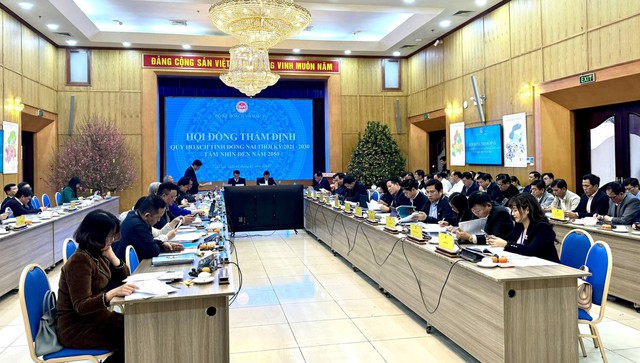
Conference on the Assessment of Dong Nai Province’s 2021-2030 Planning with a Vision to 2050
Gateway of Southern Vietnam
On February 1, the Ministry of Planning and Investment chaired the conference to assess Dong Nai Province’s 2021-2030 planning with a vision to 2050.
The national overall plan has identified Dong Nai as the Southern dynamic region, leading the country and the Southeast Asia region in terms of economy, finance, trade, services, healthcare, education, training, and the development of high-quality human resources, science, technology, innovation, and digital transformation. Therefore, Deputy Minister Tran Quoc Phuong believes that this is an opportunity for Dong Nai Province to define its mission.
The overall goal set by the Planning is that by 2030, Dong Nai will take the lead in developing a modern industry; be a center for science, technology, innovation; be the gateway of Southern Vietnam, with Long Thanh International Airport as the core. By 2050, Dong Nai will be one of the important growth poles of Vietnam.
In addition, the average annual Gross Regional Domestic Product (GRDP) growth rate for the period 2021-2030 is about 10%. The average GRDP per capita is expected to reach USD 14,650 by 2030. The GRDP growth rate for the period 2031-2050 is estimated at 6.5-7%.
The planning also identifies the construction of 5 logistics centers, one of which is the North center located at Long Thanh airport. Here, the province proposes to develop an innovative center covering an area of about 300 hectares.
The planning needs to identify and resolve major “bottlenecks”
Deputy Minister of Planning and Investment Tran Quoc Phuong said that Dong Nai has many advantages that not every locality has. In terms of nature, the province has a large area with relatively flat highland terrain, mild climate, stable water supply, and is rarely affected by storms and natural disasters. This is a ready-made opportunity and potential for the province to arrange the stable and sustainable economic and social development space.
In terms of economy, Dong Nai is a gateway of the Southeast region – the region with the most developed and dynamic economy in the country. In which, the province is one of the three corners of the development triangle Ho Chi Minh City – Binh Duong – Dong Nai; with many industrial clusters and more than 33 industrial parks established and put into stable operation by the Prime Minister.
In 2020, Dong Nai was the fifth most populous province in the country (nearly 3.1 million people); ranked 3rd in terms of total product on the territory (GRDP reached nearly VND 400,000 billion, equivalent to USD 17.2 billion), ranked 6th in per capita income (reaching VND 124 million, equivalent to USD 5,300); and ranked 19th in GRDP growth rate (over 9.0%).
In terms of culture and tourism, in addition to industrial and agricultural development potential, Dong Nai is also a land rich in traditional human culture; with many pristine and magnificent natural landscapes such as Cat Tien National Park, Chua Chan Mountain, Dong Nai River, Tri An Lake, and Mai-Bau Boiling Thac. This factor is considered as an ideal condition for investors to develop various types of tourism such as eco-tourism, resort tourism, sports tourism, entertainment tourism, research, exploration, and cultural tourism.
Moreover, the province is rapidly developing housing projects, hotels, hospitals, schools, financial and banking services, entertainment services, resorts, supermarkets, and golf courses to meet the diverse needs of investors.
However, Deputy Minister Tran Quoc Phuong also assessed that the economic and social development of the province in the past has not made a breakthrough, not commensurate with the potential and advantages of the province; the economy grew rapidly but not really sustainable; technical infrastructure and social infrastructure although have been invested, but not synchronized.
“The major challenges and bottlenecks in the province’s economic and social development in the past need to be identified and resolved in this planning to take advantage of the breakthrough momentum in terms of growth rate and quality, creating additional energy for Dong Nai to develop sustainably in the future,” emphasized Deputy Minister Phuong.
The Dong Nai Province Planning Profile submitted to the Appraisal Council at this meeting demonstrated the close attention and effective leadership of the Provincial Party Committee, People’s Council, and People’s Committee of the province in planning work. At the appraisal session, the Appraisal Council members, experts made valuable comments for the province to absorb and continue to improve, thereby submitting to the competent authority for consideration and approval.
Comments from experts focused on the following main groups of issues: Reviewing the reasonableness and compliance with the provisions of Article 32 of the Planning Law on the contents of planning appraisal; giving opinions on the provincial planning content, paying attention to the position and role of the province in relation to the region, the country, identifying “bottlenecks”, priority sectors, and new breakthrough development orientations; organizing spatial distribution and resource allocation and solutions for implementing the plan; giving opinions on the Strategic Environmental Assessment Result of Dong Nai Province Planning; giving opinions on the draft of the appraisal report prepared and submitted for comments to the plenary meeting.












